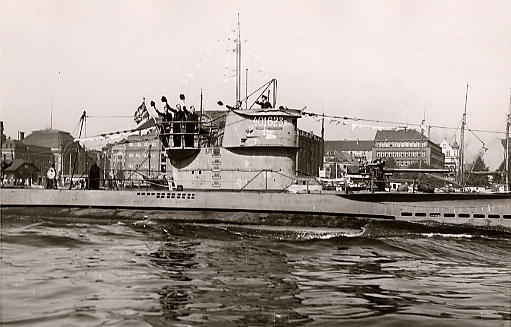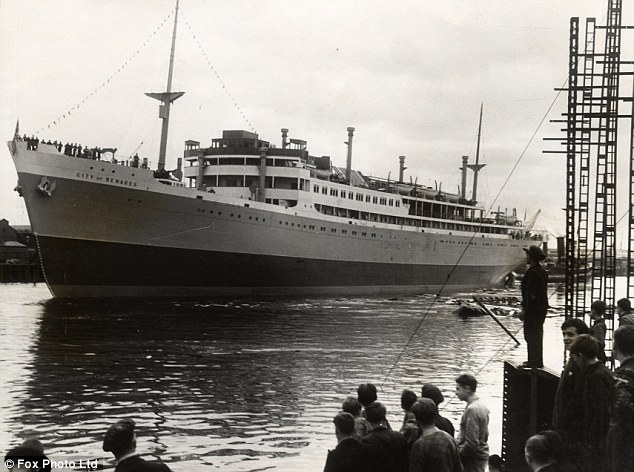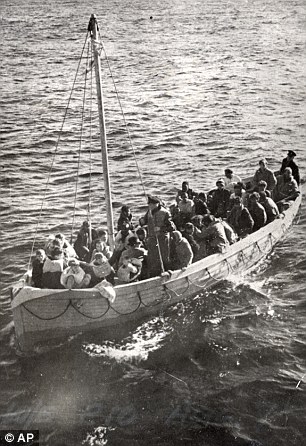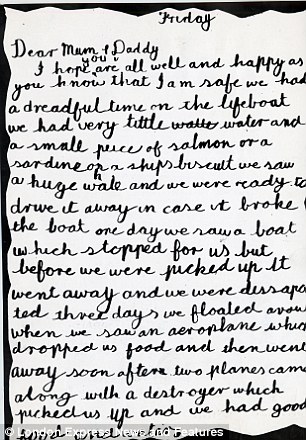FOR THOSE IN PERIL ON THE SEAS
What was the connection with the loss of nine local seamen in June 1940, with the tragic loss of 77 evacuee children just a few weeks later. The answer is the German Submarine U48. The story begins in the early days of World War II. On the seventh of June 1940, while the miracle evacuation of British and French soldiers from the beaches of Dunkirk was taking place, the British cargo ship S.S Frances Massey was nearing the end of her voyage. She was bringing 7500 tons of iron ore from Constitution Bay in Wabana, Newfoundland to The Port of Glasgow. She had been built in 1927 for the shipping company of W.A. Massey of Hull.
The crew numbered thirty-five, of which nine were known to be from the Port Talbot area and one from Briton Ferry. This was in the days before the convoy system was developed for merchant ships, and she was unarmed except for a small gun which was under the control of a Royal Marine gunner.
Just after 2am in the morning of seventh of June, and a short distance off the coast of of Donegal in Ireland, she was spotted by U48. The submarine was under the command of Kapitanleutnant Herbert Schultz who ordered two torpedoes to be fired, the first passed underneath the ship, but the second struck near to the bows. There was a violent explosion, and the ship sank swiftly beneath the waves in only thirty seconds, taking the crew to their watery grave. The cargo of 7500 tone of iron ore probably contributing to the speed of the sinking. The only survivor being the Master, Walter Whitehead, who was later picked up from the water by the Royal Navy destroyer, HMS Volunteer. The ten known local men who died were:
Edwin Rapsey Davies, aged 40, Fireman/Trimmer. Son of Thomas & Alice Davies, and husband of Sarah Gwen Davies of Aberavon.
Hubert Davies, aged 18, Sailor. Son of Thomas John and Polly Davies of Port Talbot.
William Henry Davies, aged 35, Fireman/Trimmer.
Harold Howard Edmunds M.M. aged 44, Third Engineer Officer. Husband of Alice Edmunds of Port Talbot.
Albert John Lewis, aged 15, Ordinary Seaman. Son of William Arthur and Mary Lizzie Lewis of Port Talbot.
Herbert McCarthy, aged 19, Galley Boy. Son of William Henry and Jennet McCarthy of Port Talbot.
Robert John McDermott, aged 32, Fireman/Trimmer.
Ivor William McMullins, aged 25, Ships Carpenter.
Thomas Potter, aged 27, Fireman/Trimmer. Husband of R. Potter of Briton Ferry.
Robert France Taylor, aged 23, Fireman/Trimmer.
The U48, had been on patrol since the nineteenth of August 1939 from its home port of Kiel. It sank the Frances Massey on its sixth patrol. Survivors from earlier ships it had sunk were given fresh water and food in their life-boats. It even radioed the position of some of the life-boats to the Admitalty in London.
We now come to the second part of the link. Because of the danger of bombing it was Government policy to evacuate children from areas of high risk. Many were sent to places of safety within Britain, but it was decided also to send them to countries of the Commonwealth. One of the ships chosen to take children was the 11000 ton passenger ship, City of Benares, which was built in 1936 for Ellerman Lines of London. The ship left Liverpool for Canada on 13th of September 1940, with 407 people on board, ninety of these being evacuee children. Just after midnight on the morning of 18th of September, it was spotted by U48, commanded by Kapitanleutnant Heinrich Bleichrodt. The previous commander Herbert Schultze had been hospitalised by a kidney infection. The torpedo fired by U48 struck the stern of the passenger ship. killing some of the passengers and crew. The ship listed, making it difficult to lower life-boats on the weather side of the ship, The ship was abandonded in fifteen minutes, and it sank in about thirty minutes. Some of the survivors were picked up after twenty-four hours by the Royal Navy ship HMS Hurricane. This was 253 miles west-southwest of Rockall. One of the life-boats - with children on board - was adrift for eight days, in rough seas, before being rescued by Royal Navy ship HMS Anthony. Many who had been on board died from drowning and exposure. Out of the 407 people who had set sail, 260 had died, including seventy-seven, of the ninety evacuees.
It was reported that many of the U-Boat crew were in tears when they returned to their home port and learned about the children on board. The U48 was scuttled by her crew in the Baltic Sea on 3rd of May. 1945, to prevent her falling onto the hands of the advancing allies. Heinrich Bleichrodt was charged with War Crimes because of the sinking of the City of Benares, and his argument that he could not have known there were so many children on board was accepted. He became a factory manager in Germany and died in 1977 at the age of 67.
Written by Brynmor Evans 2013
The crew numbered thirty-five, of which nine were known to be from the Port Talbot area and one from Briton Ferry. This was in the days before the convoy system was developed for merchant ships, and she was unarmed except for a small gun which was under the control of a Royal Marine gunner.
Just after 2am in the morning of seventh of June, and a short distance off the coast of of Donegal in Ireland, she was spotted by U48. The submarine was under the command of Kapitanleutnant Herbert Schultz who ordered two torpedoes to be fired, the first passed underneath the ship, but the second struck near to the bows. There was a violent explosion, and the ship sank swiftly beneath the waves in only thirty seconds, taking the crew to their watery grave. The cargo of 7500 tone of iron ore probably contributing to the speed of the sinking. The only survivor being the Master, Walter Whitehead, who was later picked up from the water by the Royal Navy destroyer, HMS Volunteer. The ten known local men who died were:
Edwin Rapsey Davies, aged 40, Fireman/Trimmer. Son of Thomas & Alice Davies, and husband of Sarah Gwen Davies of Aberavon.
Hubert Davies, aged 18, Sailor. Son of Thomas John and Polly Davies of Port Talbot.
William Henry Davies, aged 35, Fireman/Trimmer.
Harold Howard Edmunds M.M. aged 44, Third Engineer Officer. Husband of Alice Edmunds of Port Talbot.
Albert John Lewis, aged 15, Ordinary Seaman. Son of William Arthur and Mary Lizzie Lewis of Port Talbot.
Herbert McCarthy, aged 19, Galley Boy. Son of William Henry and Jennet McCarthy of Port Talbot.
Robert John McDermott, aged 32, Fireman/Trimmer.
Ivor William McMullins, aged 25, Ships Carpenter.
Thomas Potter, aged 27, Fireman/Trimmer. Husband of R. Potter of Briton Ferry.
Robert France Taylor, aged 23, Fireman/Trimmer.
The U48, had been on patrol since the nineteenth of August 1939 from its home port of Kiel. It sank the Frances Massey on its sixth patrol. Survivors from earlier ships it had sunk were given fresh water and food in their life-boats. It even radioed the position of some of the life-boats to the Admitalty in London.
We now come to the second part of the link. Because of the danger of bombing it was Government policy to evacuate children from areas of high risk. Many were sent to places of safety within Britain, but it was decided also to send them to countries of the Commonwealth. One of the ships chosen to take children was the 11000 ton passenger ship, City of Benares, which was built in 1936 for Ellerman Lines of London. The ship left Liverpool for Canada on 13th of September 1940, with 407 people on board, ninety of these being evacuee children. Just after midnight on the morning of 18th of September, it was spotted by U48, commanded by Kapitanleutnant Heinrich Bleichrodt. The previous commander Herbert Schultze had been hospitalised by a kidney infection. The torpedo fired by U48 struck the stern of the passenger ship. killing some of the passengers and crew. The ship listed, making it difficult to lower life-boats on the weather side of the ship, The ship was abandonded in fifteen minutes, and it sank in about thirty minutes. Some of the survivors were picked up after twenty-four hours by the Royal Navy ship HMS Hurricane. This was 253 miles west-southwest of Rockall. One of the life-boats - with children on board - was adrift for eight days, in rough seas, before being rescued by Royal Navy ship HMS Anthony. Many who had been on board died from drowning and exposure. Out of the 407 people who had set sail, 260 had died, including seventy-seven, of the ninety evacuees.
It was reported that many of the U-Boat crew were in tears when they returned to their home port and learned about the children on board. The U48 was scuttled by her crew in the Baltic Sea on 3rd of May. 1945, to prevent her falling onto the hands of the advancing allies. Heinrich Bleichrodt was charged with War Crimes because of the sinking of the City of Benares, and his argument that he could not have known there were so many children on board was accepted. He became a factory manager in Germany and died in 1977 at the age of 67.
Written by Brynmor Evans 2013




